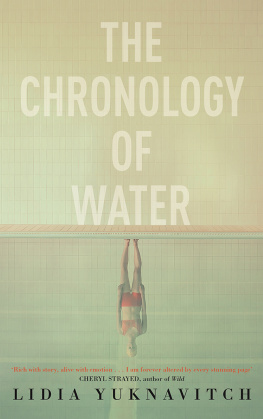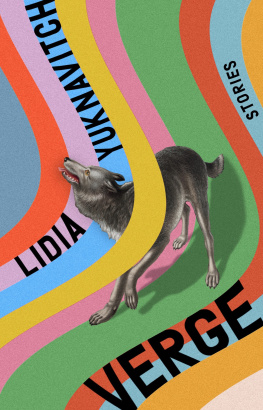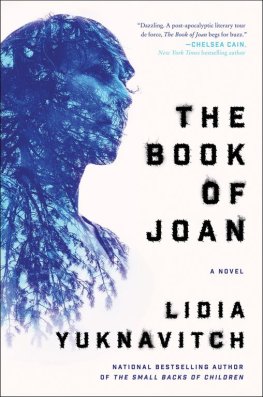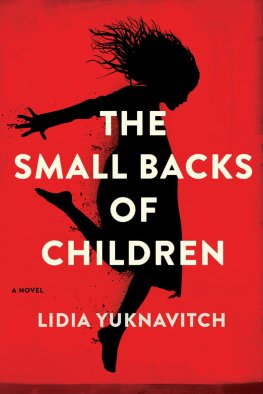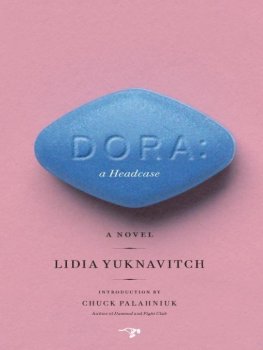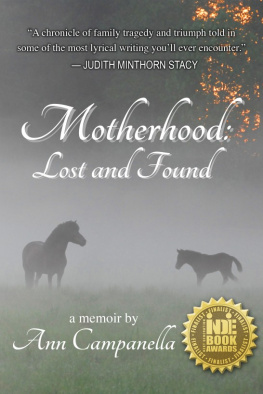Lidia Yuknavitch is the author of the novels The Book of Joan, The Small Backs of Children and Dora: A Headcase. Her highly acclaimed memoir, The Chronology of Water, was a finalist for a PEN Center USA award for Creative Non-fiction and winner of a PNBA Award and the Oregon Book Awards Readers Choice. Her TED talk, The Beauty of Being a Misfit, has been watched over two million times. Lidia teaches in Oregon, where she lives with her husband and their son. She is a very good swimmer.
@LidiaYuknavitch | lidiayuknavitch.net
Also by Lidia Yuknavitch
The Misfits Manifesto
The Book of Joan
The Small Backs of Children
Dora: A Headcase
Real to Reel
Allegories of Violence
Libertys Excess
Her Other Mouths
Caverns
First published in Great Britain in 2019 by Canongate Books Ltd,
14 High Street, Edinburgh EH1 1TE
canongate.co.uk
This digital edition first published in 2019 by Canongate Books
Copyright Lidia Yuknavitch, 2010
The moral right of the author has been asserted
First published in the United States by Hawthorne Books & Literary Arts, 2201 Northeast 23rd Avenue, 3rd Floor, Portland, Oregon 97212
Every effort has been made to trace copyright holders and obtain their permission for the use of copyright material. The publisher apologises for any errors or omissions and would be grateful if notified of any corrections that should be incorporated in future reprints or editions of this book.
British Library Cataloguing-in-Publication Data
A catalogue record for this book is available on request from the British Library
ISBN 978 1 78689 437 3
eISBN 978 1 78689 331 4
This book is for and written through Andy and Miles Mingo
Acknowledgements
IF YOU HAVE EVER FUCKED UP IN YOUR LIFE, OR IF THE great river of sadness that runs through us all has touched you, then this book is for you. So thank you for the collective energy it takes to write in the face of culture. I can feel you.
Energy never dies. It just changes forms. My beloved friends and mentors Ken Kesey and Kathy Acker are in the space dust and DNA and words.
Thank you Rhonda Hughes, editrix extraodinaire, as well as all the people at Hawthorne Books for believing in my writing. Bold Swimmers.
Thanks to Lance and Andy Olsen, my artheart heroes. And to Ryan Smith and Virginia Paterson, through the miles.
To Diana Abu Jaber, thank you for saying to me twenty years ago about a single story, I think this might be a book. It just took me a really long time to get it.
Thank you to the less than Merry Pranksters, particularly Bennett Huffman: rest peacefully, Bennett, you were the best among us, chaotic, beautiful stardust.
A great waterfall of thanks to Michael Connors for, well, everything, and to Dean Hart, for making everything possible. Thank you for mercifully loving all the mes I have brought to your doorstep.
Thank you to the greatest writing group in the history of ever: Chelsea Cain, Monica Drake, Cheryl Strayed, Mary Wysong, Diana Jordan, Erin Leonard, Suzy Vitello, and Chuck Palahniuk. And Jim Frost.
Special thanks to Chelsea for writing the introduction to the US edition, and to Chuck for inviting me in, and to Chuck and Chelsea for reading early versions of this manuscript and helping me to not lose my marbles. Well at least sometimes.
I would not be around to write this book had it not been for my sister going ahead of me. To Brigid who was Claudia: how to thank you for the lifeline of your enduring love. You have carried me well. Sister. Friend. Other mother. Poet of most tender thunder.
And though words suddenly seem remarkably puny, my pounding heart belongs to Andy and Miles you make me able to be. Write. This love. Life. I didnt know.
Contents
Tell all the Truth but tell it slant
EMILY DICKINSON
Happiness? Happiness makes crappy stories.
KEN KESEY
Here lies one whose name was writ in water.
JOHN KEATS
I. Holding Breath
The Chronology of Water
THE DAY MY DAUGHTER WAS STILLBORN, AFTER I HELD the future pink and rose-lipped in my shivering arms, lifeless tender, covering her face in tears and kisses, after they handed my dead girl to my sister who kissed her, then to my first husband who kissed her, then to my mother who could not bear to hold her, then out of the hospital room door, tiny lifeless swaddled thing, the nurse gave me tranquilizers and a soap and sponge. She guided me to a special shower. The shower had a chair and the spray came down lightly, warm. She said, That feels good, doesnt it? The water. She said, you are still bleeding quite a bit. Just let it. Ripped from vagina to rectum, sewn closed. Falling water on a body.
I sat on the stool and closed the little plastic curtain. I could hear her humming. I bled, I cried, I peed, and vomited. I became water.
Finally she had to come back inside and Save me from drowning in there. It was a joke. It made me smile.
Little tragedies are difficult to keep straight. They swell and dive in and out between great sinkholes of the brain. Its hard to know what to think of a life when you find yourself knee-deep. You want to climb out, you want to explain how there must be some mistake. You are the swimmer, after all. And then you see the waves without pattern, scooping up everyone, throwing them around like so many floating heads, and you can only laugh in your sobbing at all the silly head bobbers. Laughter can shake you from the delirium of grief.
When we first found out the life in me was dead, I was told the best thing to do was deliver vaginally anyway. It would keep my body as strong and healthy for the future as possible. My womb. My uterus. My vaginal canal. Since I had been struck dumb with grief, I did what they said.
Labor lasted thirty-eight hours. When your baby isnt moving inside you, the normal process is stalled. Nothing moved my child within. Not hours and hours of a Pitocin drip. Not my first husband who fell asleep during his shift with me not my sister coming in and nearly yanking him out by his hair.
In the thick of it I would sit on the edge of the bed and my sister would hold me by the shoulders and when the pain came she would draw me into her body and say, Yes. Breathe. I felt a strength I never saw in her again. I felt the strength surge of mother from my sister.
That kind of pain for that long exhausts a body. Even twenty-five years of swimming wasnt enough.
When she finally came, little dead girlfish, they placed her on my chest just like an alive baby.
I kissed her and held her and talked to her just like an alive baby.
Her eyelashes so long.
Her cheeks still red. How, I dont know. I thought they would be blue.
Her lips a rosebud.
When they finally took her away from me, the last cogent thought I had, a thoughtlessness that would last months: so this is death. Then a death life is what I choose.
When they brought me home from the hospital I entered a strange place. I could hear them and see them, but if anyone touched me I recoiled, and I didnt speak. I spent whole days alone in my bed in a cry that went to long moans. I think my eyes gave something of it away because when people looked at me, theyd say, Lidia? Lidia?

